
 |
![]()
NIKKI PORTER
 n
the multifaceted world of Ellery Queen, no female character
has intrigued readers and listeners quite like Nikki n
the multifaceted world of Ellery Queen, no female character
has intrigued readers and listeners quite like NikkiPorter. Originally created for the radio dramas, Nikki’s role quickly expanded, though her core remained most strongly tied to the medium where she was born. While her appearances in films, short stories, and novels cannot be ignored, it was on the airwaves that she came into her own—her voice, quite literally, giving color and warmth to the cerebral world of Ellery Queen. From a radio production standpoint, casting a female lead was practical due to the tonal contrast a woman’s voice offered, but it also opened the door to romantic dynamics that further humanized Ellery. The mystery of Nikki Porter, however, lies not just in her fictional adventures but in her shifting identity across different formats. Every time we meet her, Nikki’s appearance and background seem to change: in one version, she’s a pert blonde; in another, a red-haired secretary from West 94th Street; and in yet another, a wealthy young woman originally named Sheila Potts or Sheila Brent. Despite these discrepancies, one thing remains constant—her charming presence and the subtle tension of her relationship with Ellery. It's an "amazing" trait of the Queen universe that Nikki meets Ellery in no fewer than four different ways, depending on the source—books, radio, or film. This narrative flexibility may have been deliberate, as it added freshness and romantic suspense to their evolving connection. |
 |
|
her impact is disproportionate to her presence. She personifies the archetype of Ellery’s ideal companion: loyal, curious, and just grounded enough to balance his lofty intellect. Even when she’s not named, Nikki’s spirit seems to echo through other characters. Patience Thumm from the Barnaby Ross novels, 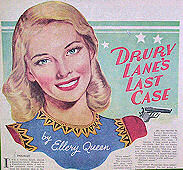 Stella
Godfrey from The Spanish Cape Mystery
(1935), and Paula Paris from
The Four of Hearts
(1938)
all possess "Nikki qualities." Even in
The
Shadow
radio scripts written by Dannay and Lee in 1938 - 1939, we find echoes of
Nikki in Margot Lane.
(Martin Grams *)
In
Double, Double
(1950),
the natural and down-to-earth, my personal favorite, Rima Anderson is
perhaps the closest embodiment of the Nikki archetype—yet she too was a
one-off. Later figures, like Judy Walsh in
The
Fourth Side of the Triangle
(1965), continue this tradition of
Nikki-like women: perceptive, competent, and always somehow out of reach. Stella
Godfrey from The Spanish Cape Mystery
(1935), and Paula Paris from
The Four of Hearts
(1938)
all possess "Nikki qualities." Even in
The
Shadow
radio scripts written by Dannay and Lee in 1938 - 1939, we find echoes of
Nikki in Margot Lane.
(Martin Grams *)
In
Double, Double
(1950),
the natural and down-to-earth, my personal favorite, Rima Anderson is
perhaps the closest embodiment of the Nikki archetype—yet she too was a
one-off. Later figures, like Judy Walsh in
The
Fourth Side of the Triangle
(1965), continue this tradition of
Nikki-like women: perceptive, competent, and always somehow out of reach. |
|
Above
right: Patience Thumm in art work from the Toronto Star Weekly dated Sunday, November 16. 1946. |
|
Under pressure of the paying public Ellery had to get more and more romantically involved. This seemed especially important since they wanted to make it in Tinseltown. It was through radio that Nikki first truly came alive. Introduced in "The Adventure of the Gum-Chewing Millionaire" (Jun 18. 1939), she was immediately characterized as a “blonde professional typist.” The radio story "The Adventure of the Lost Child" (Nov 26. 1939) states Kansas City as the place where Harvey Morrell, an old friend of her family, came from. In The Last Man Club (1941), based on one of the early radio episodes, she’s described again as “pert, blonde and pretty,” living on West 94th Street (20). Her radio presence made perfect sense: a female voice added tonal contrast and character to the medium, not to mention the romantic chemistry she sparked with Ellery. Radio also allowed Nikki to become a regular fixture long before she made her relatively late debut in the printed stories. Yet Nikki Porter was never one to be pinned down. Each time we meet her—be it in radio, print, or film—her backstory and even her appearance shift. Sometimes she’s blonde, sometimes red-haired, like in There Was an Old Woman (1943), where Ellery also claims not to have met her before the Potts murder. There, she’s “a small slim miss with nice red hair.” and her family is in New York, where she was born. Her original name was Sheila Potts (with her mother's last name) or Sheila Brent (with her father's last name)...and she's extremely wealthy. Despite this "handicap" she accepts Ellery's offer of becoming his secretary (with a salary). Nikki wasn't her real name. She changed it on the advice of Ellery. First he asks her to change her identity to Susie McGargle from Kansas City. - She doesn't like the idea and then Ellery makes a second attempt (after a heroin from one of his books) "... N-i-k-k-i . The last name Dempsey didn't fit... Nikki Jones? Nikki Brown? Nikki Green? Nikki Keats? Nikki Lowell? Nikki Fowler? Yes it had to end with -er. Parker. Farmer. Porter...Porter. Nikki Porter that's it!" She also stars in two 1952 Calendar-stories as Ellery’s loyal secretary and companion, and makes her final appearance in The Scarlet Letters (1953), where we learn she spent her childhood in Kansas City—though in earlier radio episodes, her family was placed in New York. The 1975 Wayne-Hutton TV series Ellery Queen made different choices. The producers opted for Paula Paris over Nikki Porter, despite the show being set in 1947—the heyday of Nikki’s radio career. Instead, Ellery is seen engaging romantically with other characters, such as Jenny O’Brien in The Adventure of Colonel Niven’s Memoirs, and a persistent aspiring author in The Adventure of the Eccentric Engineer. All suggesting his romantic life was fluid and fleeting. These portrayals reinforced the idea that Ellery Queen—like his creators—was not exactly a “ladies’ man.” Dannay and Lee prioritized cerebral plotting over romantic entanglements, which may explain why Nikki and other female characters often played second fiddle. Nevertheless, Nikki Porter endured in spirit if not always in presence. Whether through name, personality, or role, echoes of her remained throughout the series. And in the eyes of many fans, she was the ideal partner for the ethereal Ellery Queen. No wonder speculation arose over the identity of the mysterious “Mrs. Queen” mentioned by J.J. McC. For many, it could only have been Nikki Porter—a conclusion far easier to accept than solving the ongoing mystery of Ellery’s mother, whose identity remains unknown to this day. |

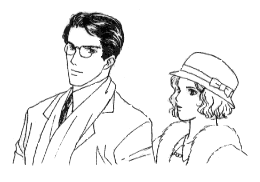
|
It appears not everyone was a fan of certain characterizations, as the following paragraph taken from a letter dated March 20. 1943, written to Fred Dannay by critic Anthony Boucher proofs: "I don't like Nikki. It's partly the voice, but also the character itself. She's too damned chipper. She affects me like those people who are bright-eyed and gay the next day while you have the grandfather of all hangovers. I haven't seen Margaret Lindsay play her, but I should guess that it's just what she deserves..." (Arthur Vidro). It was Marion Shockley who played Nikki at that time... As for the portrayals we have several actresses both on radio, TV or film to have played Nikki. In movies Nikki made her debut in 1940, only one year after she did the same on radio. In most of the later movies the influence of MGM's successful Thin Man series was obvious, as Ellery and Nikki engage in more comic squabbling than in sleuthing. |
| Below is a list of actors who portrayed Nikki Porter, either as voice actors or in person on TV or in film. The order is chronological, based on when they made their debut: |
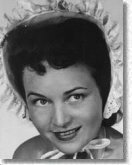 The first actress to portray Nikki Porter (on radio). In "The Gum-Chewing Millionaire" she's a blonde professional typist who soon applies for the job of personal secretary. ... (click on picture for more) |
|
As actrice
she bounced between A and B pictures,
working with top leading men.
Her B-movies included the female lead in seven Ellery
Queen films.
...
(click on picture for more) |
|
|
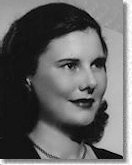 In 1945 Lee and Boucher thought Barbara was excellent as a girl who could do anything a script demanded. They even included more Nikki-Ellery interaction. ... (click on picture for more) |
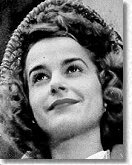 In 1945 following her successful radio appearances in Dangerously Yours (1944) and Matinee Theatre (1945) Trudy was picked to play Nikki Porter playing opposite Sydney Smith ... (click on picture for more) |
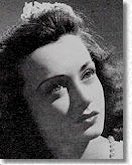 Nikki in the 7th radio season of Ellery Queen (1946-1947). She reprised the role, in '48, when Ford Theatre re-ran a first season episode "Bad Boy", and again in the 1954-56 television series. ... (click on picture for more) |
|
|
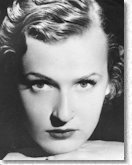 When Kaye replaced Virginia as Nikki Porter in 1948 she was already married to Manfred B. Lee. ... (click on picture for more) |
|
|

|
|
| Introduction | Floor Plan | Q.B.I. |
List of Suspects | Whodunit? | Q.E.D. | Kill as directed | New | Copyright Copyright © MCMXCIX-MMXXV Ellery Queen, a website on deduction. All rights reserved. |